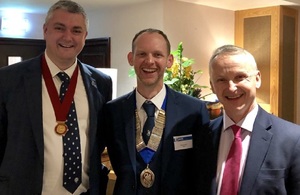- Government invests £40 million to develop the next generation of nuclear energy technology, creating R&D and manufacturing jobs across the UK
- funding will develop technologies to supply low-carbon heat, hydrogen, and other clean energy for decades to come
- building new, low-carbon industry will support the UK’s clean economic recovery as we move towards net zero emissions by 2050
The UK government today announced £40 million of funding to unlock thousands of green jobs by developing the next generation of nuclear energy technology.
Part of this funding will support 3 Advanced Modular Reactor (AMR) projects, which are far smaller than traditional nuclear plants and use intense heat generated in nuclear reactions to produce low-carbon electricity. They can be used at remote locations thanks to their size, and can produce enough energy to power anything from a small village to a medium-sized city.
£30 million of funding will speed up the development of 3 AMR projects in Oxfordshire, Cheshire and Lancashire and drive them closer towards supplying low-carbon energy to the nation. The remaining £10 million will be invested into unlocking smaller research, design, and manufacturing projects to create up to 200 jobs.
Minister for Business and Industry, Nadhim Zahawi, said:
Advanced modular reactors are the next step in nuclear energy and have the potential to be a crucial part of tackling carbon emissions and climate change.
Today’s investment will immediately create new jobs in Oxfordshire, Cumbria and Lancashire. But through this vital research, the technology could also create thousands more green collar jobs for decades to come.
Today’s funding will ensure the technology is more attractive to private sector investors, supercharging the development of the industry and creating supply chains feeding future modular reactor developments. The successful AMR projects, awarded £10 million funding each, are:
- Tokamak Energy, Oxfordshire – working with industry partners and research establishments including Oxford University to develop fusion reactors
- Westinghouse, Lancashire – developing a lead-cooled fast reactor, a type of fission reactor
- U-Battery, Cheshire – working on a small high temperature gas-cooled fission reactor
On top of funding the AMR projects, the government will invest £10 million into turbocharging the industry – £5 million of that will be invested in British companies and start-ups, developing new ways of manufacturing advanced nuclear parts for modular reactor projects both at home and abroad. Regional projects that have secured funding so far include:
Cheshire
- U-Battery, Concept Development and Demonstrator for U-Battery AMR Off-Site Modular Construction in Capenhurst – £1.1 million
- Jacobs, Evaluation Technologies for Advanced Manufacturing Qualification in Warrington – £181,431
Yorkshire
- Laser Additive Solutions, SonicSMR, in Doncaster – £826,633
- Cavendish Nuclear, AWESIM in Sheffield – £1.3 million
- Sheffield Forgemasters, Large scale thick section electron beam welding – £8 million
Derbyshire
- Rolls-Royce Submarines, SAS in Derby – £259,989
- Rolls-Royce Submarines, FAST in Derby – £1.4 million
- Nuclear Energy Components, PITCO2C, in the Hope Valley at Bradwell – £378,000
Cumbria
- Createc Technologies, MW-CT in Whitehaven – £314,595
Merseyside
- Cammell Laird, FAITH in the Wirral – £5.1 million
Gloucestershire
- EDF Energy, in Gloucester, £1,373,095
The remaining £5 million will be put to strengthening the UK’s nuclear regulatory regime -– ensuring it remains one of the most robust and safest in the world as the UK looks to develop and deploy advanced nuclear technologies.
Recent research has shown that the UK’s entire nuclear industry could contribute £9.6 billion per annum to the economy and support 130,000 jobs by 2050, as well as creating significant export potential for AMR technology. AMRs also provide the possibility to diversify the UK’s low-carbon energy mix by producing heat for industry and zero-carbon hydrogen, and have already demonstrated the potential to stimulate private investment.
A significant part of the UK’s nuclear research takes place in a belt running from Cumbria to North Wales – a region that could be set to benefit from the nuclear industry’s enormous potential for job creation, in part thanks to this investment.
Today’s announcement – an important part of the Nuclear Sector Deal – is an important step forward in meeting the aspirations in the UK’s Industrial Strategy.
This builds on government plans to support tens of thousands of green jobs with a package of measures worth over £3 billion, unveiled by the Chancellor on Wednesday to power up the nation’s workforce and protect the environment.
Funding for the AMR and advanced manufacturing projects is provided through the BEIS £505 million Energy Innovation Programme. Find out more from our Funding for nuclear innovation page.
The exact funding of the Advanced Modular Reactor projects breaks down as:
- Tokamak Energy Ltd, Advanced Modular Fusion – The Spherical Tokamak, £9,999,999
- Urenco Ltd, U-Battery, £9,999,195
- Westinghouse Electric Company UK, An Innovative Nuclear Solution based on Lead Fast Reactor Technology, £9,998,387
The £5 million funding provided to the UK Nuclear Regulators will enable them to continue to engage with all stakeholders on how they can progress future regulatory assessment that keeps pace with technology.
